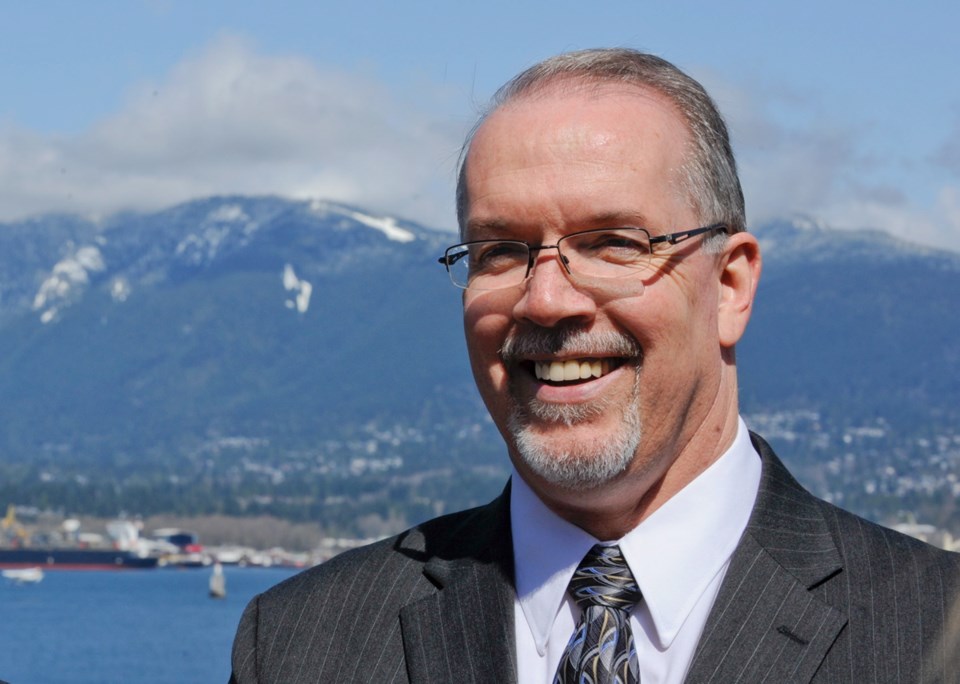 There’s a certain amount of political ju-jitsu behind the B.C. Liberals’ move to cut medical premiums for many people who qualify.
There’s a certain amount of political ju-jitsu behind the B.C. Liberals’ move to cut medical premiums for many people who qualify.
The government sat like a rock for ages, refusing to budge in the face of regular calls for the elimination of Medical Services Plan premiums.
The NDP and others kept pushing the idea, refining it with additional ideas on how to make up the lost revenue, which last year was about $2.5 billion.
As explained by NDP Leader John Horgan, the party stands for eliminating the MSP over a four-year budget cycle, rolling it into the provincial income-tax regime, with an eye firmly on the affluent. It would mean progressively higher payments for higher-income earners.
After that position was staked out, the Liberals made their move last week, promising to chop the premiums next year by 50 per cent for a wide swath of income earners, with no reference to any tax hikes elsewhere to make up for the loss.
It’s a flat $900 saving for households earning up to $120,000. After standing pat and letting their opponents commit to something, they upped the ante and moved well past it. If the Liberals win in May, they’ll be down $845 million in premium revenue by the end of 2018. Finding out if they could take that hit without raising taxes is a long way off. Working to eliminate the MSP entirely, now also a Liberal promise, is even further off.
In the long run, that idea looks distinctly sketchy. The half-price sale rolls the average premium back to 1990s levels. It’s feasible because they’re counting on enough surplus to cover the forgone revenue.
But no government can blow off $2.5 billion a year in ongoing annual revenue without making it up somewhere. (Not to dwell on a sore point, but it would take three LNG plants to make up that kind of money.) In the here and now, though, the unconditional 50 per cent cut looks more attractive for more people, depending on how the NDP would design the makeup tax hikes.
No matter how anyone tinkers with MSP, it gets complicated in a hurry, as many employees have their premiums paid by employers.
Workers who have MSP paid by employers as a taxable benefit wouldn’t notice elimination or reduction of the premiums. That’s a break for the employers. But employees would notice the higher income tax many would pay to make up the lost premium revenue.
It’s worth recalling that at the B.C. Liberal Party convention last November, MSP premiums were discussed, and there was a noticeable enthusiasm for getting rid of them.
A delegate was warmly applauded for saying it’s a costly, inefficient way to tax people, and the money could be raised in simpler ways. Health Minister Terry Lake told party members it was getting a hard look, and noted it would be “the biggest red-tape reduction initiative we could make.”
The budget doesn’t quite accomplish that goal. The change maintains the MSP administration system, but slashes the revenue it produces.
Liberals have wasted no time pinning the NDP to the original position of replacing MSP premiums with income tax hikes. “Cynical game of hide and seek … designed to deceive … hike taxes to pay for reckless spending.” Those were the highlights of a Liberal caucus news release soon after the budget.
Their slightly hysterical view of the Opposition’s plan is that the MSP would be eliminated in name only and “continue to be collected in the form of a massive middle-class tax hike.”
The one thing that MSP does accomplish is establish that Canada’s universal medical coverage does have a price tag. Even though it covers scarcely 13 per cent of the provincial health budget, it’s the one up-front reminder that the system costs money.
The endless tinkering to soften the reminder of that hard truth has resulted in two million lower-income people and children being exempted from the payments. That in turn has resulted in increased payments by everyone else, to the point they’ve doubled in the past 15 years.
Not to look a $900-a-year tax break in the mouth, but the search for perfect progressivity still has a way to go.



